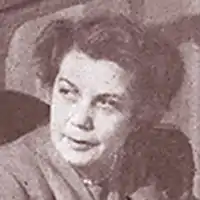
Marcelle Dormoy (1895–1976) was a French couture fashion designer active from the 1910s to 1950, and a former model.[1]
Dormoy was born Marie-Léonie Graftieaux, but changed her name to Marcelle Dormoy in 1916 soon after the birth of her son Pierre-Edouard.[2] Graftieaux started out as a mannequin for Paul Poiret, which she credited with helping her learn to "understand the female body."[3] At this time, her grandson has claimed, Graftieaux met Edward, Prince of Wales, probably at Luna Park, Paris and he may have fathered her son.[2] Pierre-Edouard's birth was registered over a year after the event, and the certificate does not identify his father, but in addition to her name change, Dormoy reportedly came into a sum of money that enabled her to set up a dressmaking business.[2] Later, in the mid-1940s when Dormoy's grandson François was born, his mother received an unexplained gift of a Van Cleef & Arpels "cadenas" diamond watch-bracelet made after a design originally commissioned by Edward (now the Duke of Windsor) for his wife Wallis Simpson - a gift that Pierre-Edouard Graftieaux could not have afforded to give his wife.[2]
During the 1920s, Dormoy worked with Vionnet alongside other designers such as Jacques Griffe and Marcelle Chaumont.[4] As première d'atelier, she was head of the workroom at Vionnet until she left to launch her own couture house in December 1928.[5] This date was open to question even while Dormoy was in business, with M.D.C. Crawford stating in 1941 that Dormoy launched "his" (sic) business in 1934,[6] and the mannequin "Freddy" recalling a launch date of 1927 in her 1958 memoirs.[7]
In 1937 Dormoy had her portrait painted by the artist Marie Laurencin, who accepted a fur coat as payment. This portrait was sold by the Swiss auction house Dobiaschofsky in 2013.[1]
Dormoy remained with Jean Patou in Biarritz prior to returning to Paris, following the German occupation of France during World War II.[8] She continued working during the Occupation, providing clothes to clients such as the actress Edwige Feuillère.[9] In February 1946, Collier's published an article about Feuillère and Dormoy, noting that Dormoy's designs were among the first post-war models "by leading designers" to be bought by American buyers for export back home, despite a poor exchange rate meaning that each design cost $500–600.[9] A picture caption in the article noted that Dormoy's unfussy designs typically featured free-flowing lines.[9]
Dormoy closed her house in 1950, and died in 1976.[1] Her son and daughter-in-law presented a 1948 evening gown that she had designed to the Musée Galliera.[3]
References
- 1 2 3 Staff writer. "Dobiaschofsky Auktionen: Frühjahrsauktion 2013 Gemälde, Grafiken und Antiquitäten" (in German). AltertuemLiches.at. Archived from the original on 28 February 2014. Retrieved 19 October 2015.
- 1 2 3 4 Samuel, Henry. "Duke of Windsor had a love child with a Parisian seamstress – and paid to keep her silence, new book claims". The Telegraph. Retrieved 5 May 2017.
- 1 2 "Evening dress, Marcelle Dormoy: Variation on the 'Bengale' model". Palais Galliera, musée de la Mode de la Ville de Paris. Retrieved 3 December 2014.
- ↑ Fashion under the occupation, Dominique Veillon, Berg Publishers, 2002, pg. 100.
- ↑ Golbin, Pamela, ed. (2009). Madeleine Vionnet. New York: Rizzoli. ISBN 978-0847832781.
DECEMBER: Marcelle Dormoy, former première d'atelier, opens her own fashion house
- ↑ Crawford, M.D.C. (1941). The ways of fashion. [New York: G.P. Putnam. p. 318. ISBN 0848647831.
- ↑ Carlier, Jean (1958). Flying mannequin - memoirs of a star model. Hurst & Blackett. ISBN 9787410001469.
- ↑ Fashion under the occupation, Dominique Veillon, Berg Publishers, 2002, pg. 11.
- 1 2 3 Calvosa, Ulrich (16 February 1946). "Paris Model 1946". Collier's. Retrieved 6 December 2014.
Further reading
- Grosso, Hélène; Siccardi, Jean; Graftieaux, François (22 September 2016). L'homme qui aurait dû être roi: L'incroyable récit du petit-fils caché d'Edouard VIII (in French). Le Cherche Midi. ISBN 9782749148373.